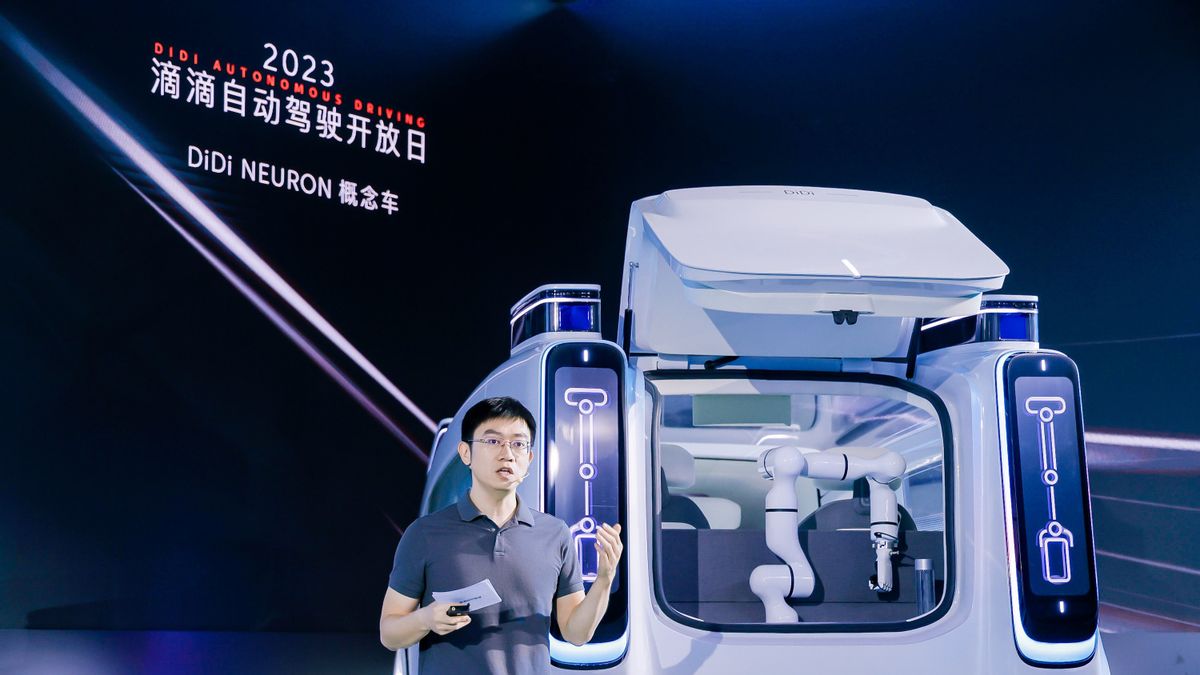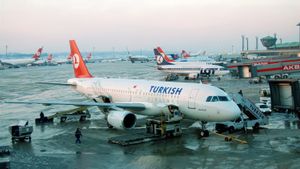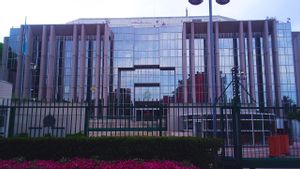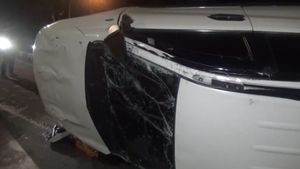JAKARTA - Chinese ride-hailing company DiDi Global will introduce its first mass-produced taxi robot on its platform starting in 2025, as it seeks to drive large-scale autonomous vehicle adoption.
The taxi robot is being produced by DiDi Autonomous Driving, the self-driving technology division of Beijing-based companies, he said in a statement last month.
"This is the result of collaboration with new energy vehicle manufacturers in various fields, including the selection of vehicle platforms, cockpits and the development of smart driving systems," he said.
The decision to introduce the vehicle is backed by "DiDi's extensive experience in joint mobility services and cutting-edge technology," said DiDi Autonomous Driving CEO and DiDi Global Chief Technology Officer Zhang Bo.
"We believe the introduction of a mixed delivery system that combines autonomous and traditional vehicles in a shared mobility network is the future of transport efficiency," Zhang Bo said, as reported by The National News May 14.
L4 refers to the second-highest level of vehicle autonomy from six levels, which starts from 0 to 5, where vehicles do not require human intervention in most circumstances. Level 5, the highest, does not require human attention and vehicles with this status may not even have a steering wheel or pedal.
#DiDiAutonomousDriving at the Shanghai Open Day announced its first mass-produced #Robotaxi to DiDi’s ride-hailing platform by 2025. Check out more on #Kargobot, the concept robotaxi #DiDiNeuron, and DiDi Beiyao Beta LiDAR and Orca here 👇https://t.co/OE3F72jrgq pic.twitter.com/4qtdL0EDKI
— DiDi (@DidiGlobal) April 14, 2023
#DiDiAutonomousDriving at the Shanghai Open Day announced its first mass-produced #Robotaxi to DiDi’s ride-hailing platform by 2025. Check out more on #Kargobot, the concept robotaxi #DiDiNeuron, and DiDi Beiyao Beta LiDAR and Orca here 👇https://t.co/OE3F72jrgq pic.twitter.com/4qtdL0EDKI
It is known, car manufacturers are competing to present self-driving autonomous vehicles (AVs) to the highway as part of the next generation of transportation.
State-of-the-art computers controlling AVs allow for a smoother driving experience, with controlled speed and acceleration, which can also result in more efficient use of fuel, according to Earth.org environmental news and data platforms.
Meanwhile, the global autonomous vehicle market value is expected to exceed $1.8 trillion by 2030, from just about $94.4 billion by 2021, growing at a combined annual rate of nearly 39 percent, the latest data from Prevention Research shows.
This is close to an earlier estimate from analysts at Swiss bank UBS, where the market could be worth around $2 trillion per year by 2030.
However, concerns also arise about AV security, with vehicles developed by companies such as Tesla Motors, the world's largest electric vehicle maker, and Google involved in accidents, some of which were fatal.
However, DiDi has "prioritized safety" since its fleet of more than 200 taxi robots was deployed for services on demand in Shanghai in 2020, he said.
SEE ALSO:
"DiDi's robotic taxi service has a strong safety record and has been operating safely for 1,020 consecutive days," explained Meng Xing, chief operating officer at DiDi Autonomous Driving.
"To meet the demand for diverse and growing user mobility today and in the future, we will continue to optimize our taxi robot services by continuing to improve the experience of motorists," he said.
DiDi Autonomous Driving also unveiled the concept of its first taxi robot, DiDi Neuron, which is equipped with a robotic arm inside a vehicle that can pick up baggage, wake up passengers, and pick up goods from all over the cabin, as well as its new autonomous truck business, Cargobot.
The English, Chinese, Japanese, Arabic, and French versions are automatically generated by the AI. So there may still be inaccuracies in translating, please always see Indonesian as our main language. (system supported by DigitalSiber.id)


















